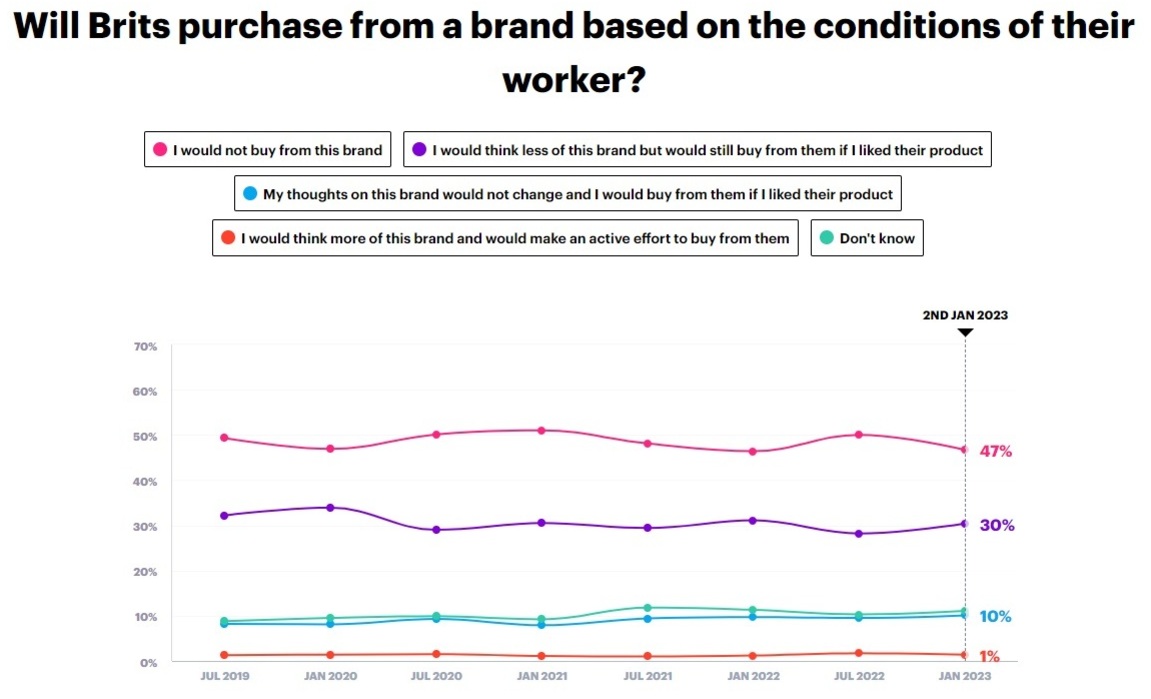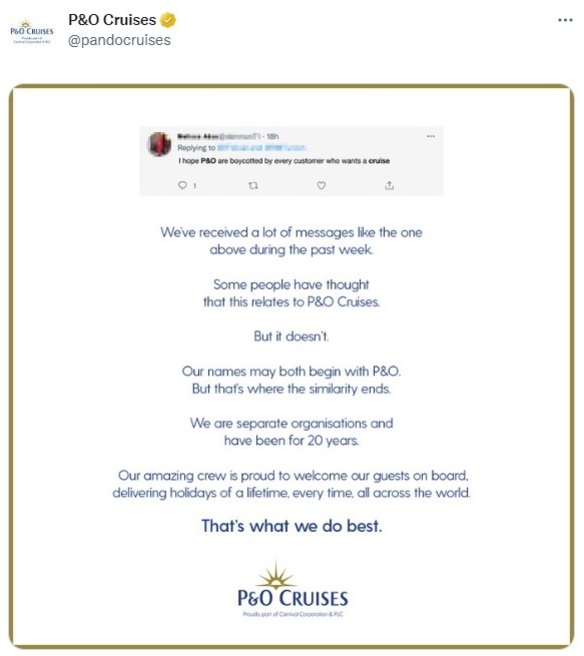When an employment law failing becomes a PR nightmare
Posted on 5th January 2023 at 12:23
We know that an employment law dispute can be costly and stressful. But with the internet giving everybody an outlet for complaints, and each generation placing more importance on brands behaving ethically, employment disputes are also a reputational crisis for brands.
But does it really matter? You may think that a PR crisis is only a problem for large companies that are house-hold names. Larger companies with an existing reputation may have more to lose, and news about them may gain more traction. But a crisis can be just as bad for small businesses, as a smaller customer base means every customer lost has a bigger impact. Smaller companies often don’t have the cash reserves to see them through a dip or to recover their reputation through expensive marketing campaigns.
No matter what your industry or size, employment mistakes can be deadly for your brand.
It will put customers (and workers) off your brand
Half of people asked would not buy from a brand that treated their staff badly. A further 28% would think less of them, suggesting that cumulative damage from a number of issues could eventually affect these sales too.
Having a reputation as a bad employer could also make it more difficult to recruit top talent in the future. Nobody wants to work for a company that treats them badly, but each generation is seemingly more concerned about ethics.
According to BUPA “One in three [of Generation Z] (31%) would turn down roles in companies with poor ESG credentials, and over half (54%) would take a pay cut to work for a business that reflects their ethics, on average sacrificing more than a quarter (27%) of their salary.”
Meanwhile “More than one in five (22%) 18-34-year-olds listed corporate values as their leading concern when choosing a new role, above salary, and half (50%) say they research a prospective employer’s corporate values before applying for a role”

What happens on the internet, spreads on the internet
In the past poor employment practices might only have come to the public attention if they made it all the way to the tribunal, but social media has made it much easier for disgruntled employees to share their grievances and for disputes to become big news.
In an early example from 2013, a worker at HMV live-tweeted firings from the official company account, which saw #hmvXFactorFiring trend on Twitter. (It’s worth noting that I didn’t use Twitter in 2013, but managed to stumble upon an article about the incident 9 years later.)
In 2016, agency worker Nicola Thorpe set up an online petition against sexist dress codes, after PwC insisted female staff must wear heels. The petition made headlines and received more than 50,000 signatures – which meant it even received a response from the government. PwC changed their dress code, but only after it had been publicly condemned for sexism by tens of thousands of people.
On TikTok, the hashtag #quitmyjob has 194.1million views on TikTok while #iquitmyjob has 40.9million. On the reddit discussion “r/antiwork”, a community of over 1.6million shares stories of poor treatment by their employers. Many social-media users are keen to celebrate those who prioritise their wellbeing by quitting harmful jobs, meaning that posts from workers who have been badly treated have the potential to gain traction.
Bad faith complaints may come to nothing, but if your ex-employee has a genuine complaint, or others are encouraged to come forward with similar experiences, one complaint can soon spiral into a PR crisis.
Along with social media, online news sites and blogs mean bad publicity never completely disappears. Posts about an organisation’s failures may appear in search results for the company name or related information for years to come.
You can’t always rely on a confidentiality agreement
Non-disclosure agreements (NDAs) are increasingly treated with suspicion following misuse in several cases. As well as facing tighter regulation, some employees may refuse to sign a settlement that includes an NDA – as was the case for Azeem Rafiq, in his tribunal claim against Yorkshire Country Cricket Club. A settlement was eventually reached when the cricket club removed that term from the agreement, but only after weeks of headlines about the tribunal hearing.
Even a signed agreement won’t necessarily protect you. Many of the women who spoke up about sexual abuse by Harvey Weinstein had signed agreements, but eventually decided that the risk of speaking up was worth taking. The scandal did enough damage to send the Weinstein Company into bankruptcy, and the attempt to cover up the matter with confidentiality agreements only added fuel to the fire.
Compensation won’t necessarily undo the damage
Most people were hardly aware of P&O Ferries 12 months ago, but now the name is synonymous with unfair redundancies. During the scandal, the Chief Executive admitted he knew that their procedures were unfair but took the decision that following the correct procedure was so uneconomical that compensating staff would be cheaper. The news that staff would be compensated for the breach didn’t do anything to help rebuild the brands reputation, just created more anger at the disregard for fair process.
In fact, the damage was so bad that even P&O Cruises suffered a hit from being similarly named, despite having no connection to P&O Ferries. It’s trust scores and BrandIndex scores dropped significantly and consumers were far less likely to recommend their services. The company even launched a marketing campaign to separate itself from P&O Ferries.
Even unintentional mistakes can damage your reputation
The government regularly publishes the names of companies that have failed to pay the minimum wage. This includes companies who failed to understand their obligations around work-related deductions or to pay staff for mandatory training, travel time or trial shifts rather than intentionally underpaying staff. When John Lewis featured on the list for such mistakes, it spent the day trending on twitter and was included in a number of headlines.

A knee-jerk reaction could do more damage long term
Your legal obligations as an employer should always come first - avoiding the reputational damage of a legal dispute is just one of many reasons to follow the law. Employers who instead take a knee-jerk reaction to protect their reputation in the short term can end up doing more damage.
When Garden Court Chambers received complaints about contentious tweets made by one of their barristers, the chambers responded “in haste” by announcing an official investigation. It hoped “to damp down the Twitter storm so as to limit the damage to chambers reputation.” However, appointing an investigator at this point did not follow the complaints procedure, and the tweet “suggested she had done something which at the least required investigation… which could suggest some punishment.” In doing so the chambers discriminated against the Barrister based on her protected philosophical belief.
Instead of a short-lived Twitter storm, the organisation was at the centre of a high-profile tribunal hearing which lasted months and generated huge numbers of headlines.
Customers are savvy to empty PR
In the past, good PR and marketing may have been enough to save you from the reputational damage of poor employment practices. But customers are happy to hold businesses to account when their marketing doesn’t match up to reality.
On International Women’s Day 2022, a twitter profile called Gender Pay Gap Bot shared posts about International Women’s Day from businesses, while quoting their gender pay gap. This resulted in a lot of employers being called out for using the day for marketing, while actually paying female staff less on average than male staff, with obvious backlash. Of course, there were also some companies who were shown in a positive light, when their lack of a gender pay gap backed up their post, showing genuine commitment to their promises.
Similarly, there’s a growing backlash against so-called ‘rainbow washing’ – where companies celebrate Pride month by changing their logos to rainbow symbols, while their policies or trading practices do nothing to tackle homophobia.
So what should businesses do?
Despite all we have just said, focusing too much on reputation can be counterproductive, as you will be focused on the short term and may simply end up playing whack-a-mole with crises. When facing a dispute, it is important to take a step back and consider how to act legally rather than a knee-jerk reaction to dampen the crisis or appease complainants.
Employment Law advice can help you avoid damaging mistakes. Although this may seem costly, it could prove to be a valuable investment in saving you from longer term reputational damage. Knowing for certain that you have acted legally and reasonably, you can explain your position with confidence.
Tagged as: Employers, Non-disclosure agreements
Share this post:










